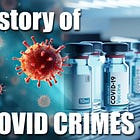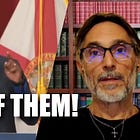Dr. Joseph Ladapo: Why Medical Freedom is Essential
The importance of moral renewal, personal responsibility, and medical freedom in Florida and beyond
In Dr. Joseph Ladapo’s presentation at the World Council for Health he articulates a clear moral foundation for medical freedom and public responsibility. As Florida’s Surgeon General, trained at Harvard in medicine and health policy, he argues that individual sovereignty over one’s body is not merely a political stance but the basis of ethical governance.
We cannot carry this mission forward without you. Your support fuels our research, amplifies public awareness, and powers grassroots movements driving real, lasting change. To contribute, consider a paid Substack subscription or making a one time donation today.
Credits
Dr. Joseph Ladapo, the Surgeon General of Florida, is leading important efforts to restore personal autonomy to the people of his state. You can find him at: (X, Florida Health)
A special thank you to WCH Florida for hosting this excellent event at the Grand Oaks Resort.
The Foundations of Liberty in Medicine
Dr. Ladapo begins with a principle that is both self-evident and often violated, especially in recent years: no authority has the right to dictate what enters a person’s body. This lies at the heart of the concept of freedom that shaped modern democratic societies. Every person arrives in the world with a body and a will, and from these arise the powers of creation, choice, and moral agency. To surrender control over either is to forfeit the very basis of human dignity and freedom.
The recent imposition of mandates marked a profound reversal of these principles. By making participation in society contingent on compliance with medical orders, public institutions prioritized coercion at the expense of personal freedom. This inversion has turned medicine into a mechanism of control, eroding the trust between citizens and their health systems.
The Weaponization of Fear
Central to Dr. Ladapo’s analysis is the recognition that fear has become both a political and an economic force. During the COVID era, institutions justified unprecedented restrictions in the name of “safety” while discouraging open discussion and critical debate. Fear became an efficient tool for managing populations and securing compliance, serving the interests of those who profit from control and dependency.
Dr. Ladapo challenges the assumption that mandates and coercion protect public health. Instead, they foster dependence and disempowerment while concentrating power and wealth in the hands of a few. Personal health requires the exercise of personal judgment, which cannot develop under compulsion or fear. The strength of a nation’s public health system, therefore, depends on cultivating citizens who can think, decide, and act freely.
Personal Responsibility and Freedom
The founding fathers of the United States of America understood that liberty is inseparable from responsibility. They risked their lives to create a constitutional government and to return power to the individual. Their courage came from recognizing both the value of freedom and the strength it cultivates. They also knew that freedom demands personal responsibility—that each citizen must be disciplined enough to use it wisely. The same principle applies to health. When individuals take responsibility for their choices in diet, exercise, and moral conduct, they can achieve more for themselves than any government could ever impose by force.
Dr. Ladapo distinguishes between a state that supports well-being and one that controls it. The first empowers people to make informed decisions; the second weakens them under the guise of protection. The expanding medical bureaucracy has become a test of whether society will continue to trade independence for comfort, or rediscover the strength and dignity that come from personal responsibility.
Rebuilding Trust Through Truth and Integrity
Dr. Ladapo’s leadership in Florida has embodied this philosophy. Under his direction, the state has removed vaccine mandates, defended informed consent, and encouraged open discussion of medical evidence. These actions, though receiving pushback from increasingly irrelevant legacy media platforms, reflect a consistent commitment to truth as the foundation of policy.
The path forward lies not in new technologies or greater regulation, but in moral reconstruction. Public health must be rebuilt on transparency, consent, and respect for the individual, with no use of coercion. When citizens are free to make their own choices, and when those choices are informed by truth rather than fear, medicine can once again serve its proper purpose.








Truly appreciated this short video from Dr. Ladapo.
Great essay Dr. Trozzi!